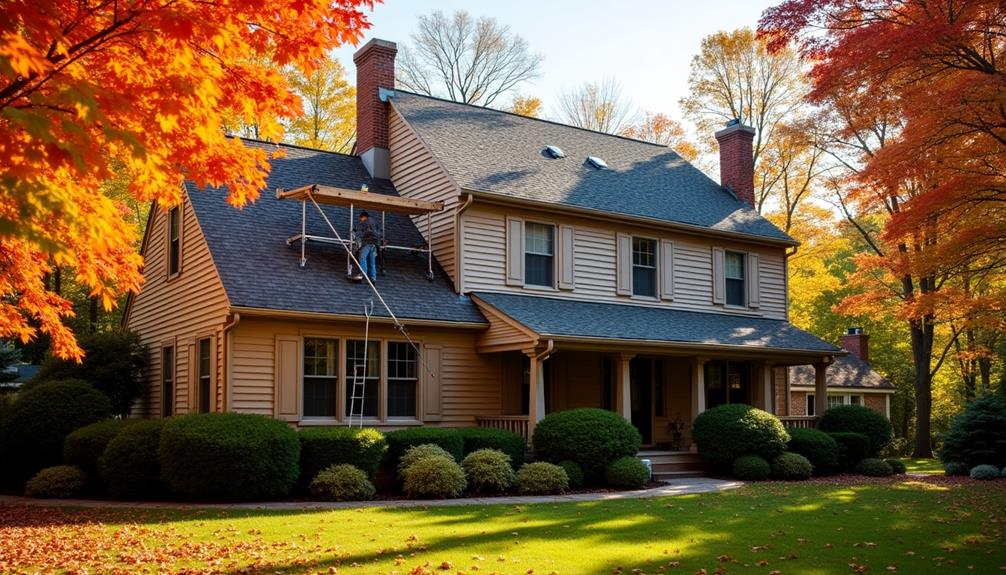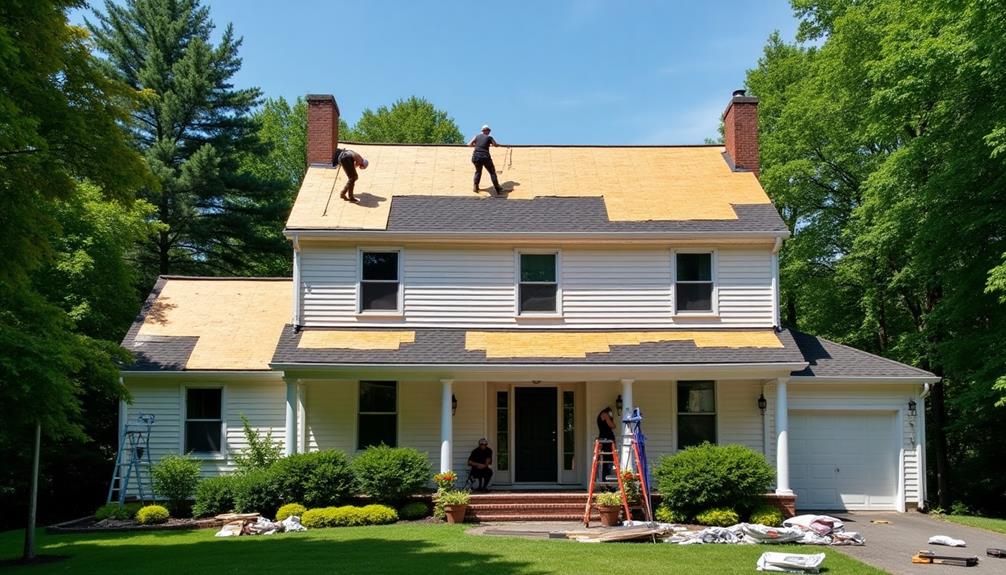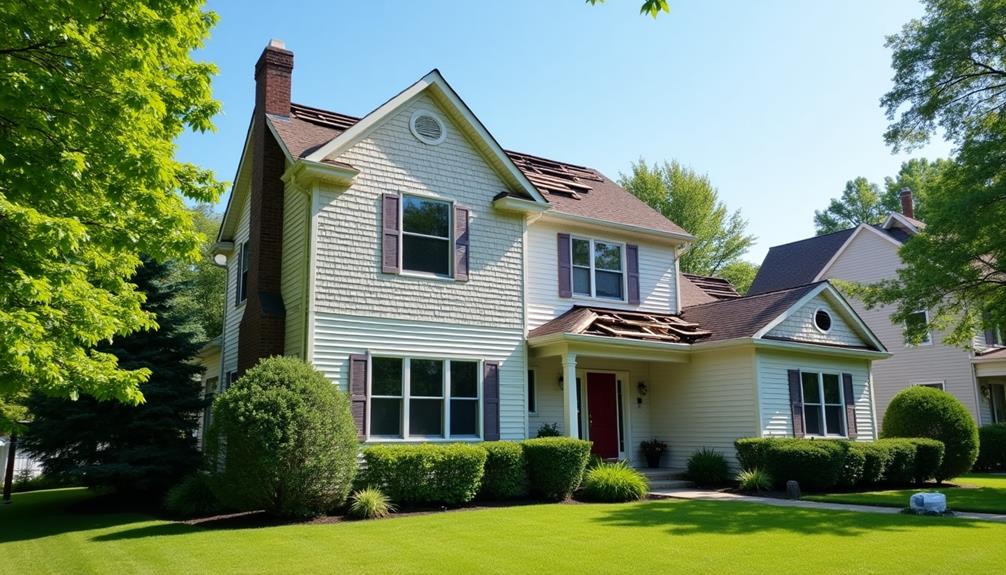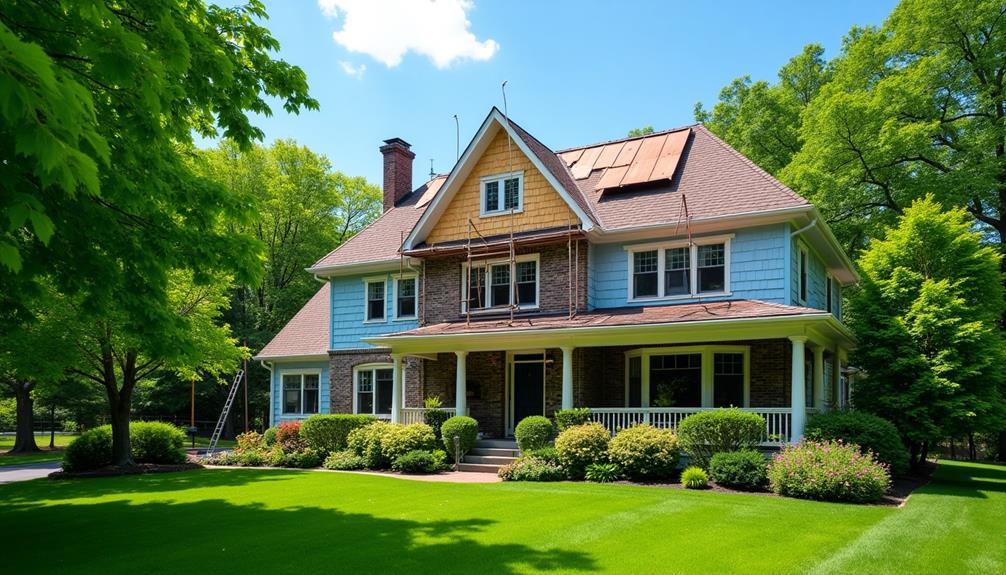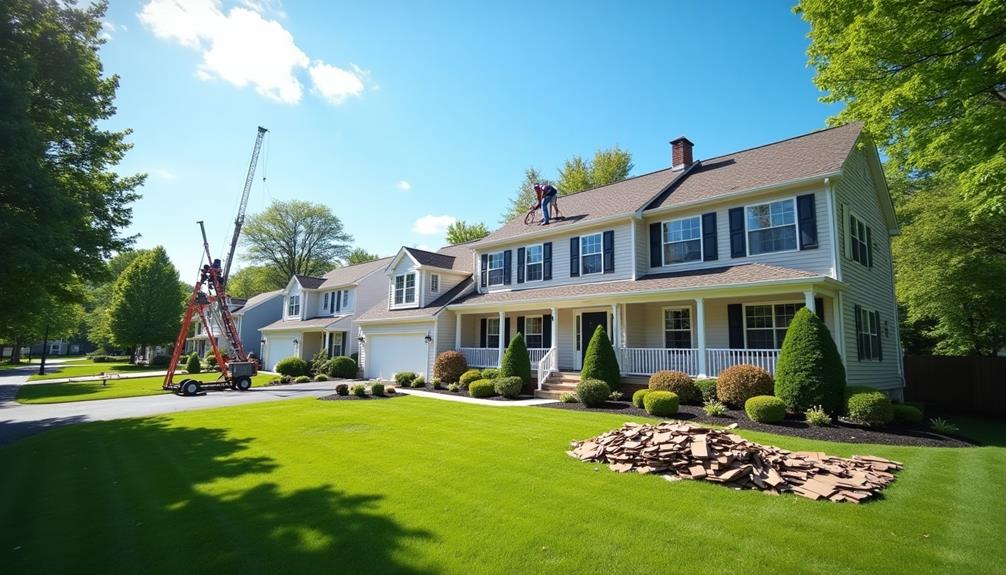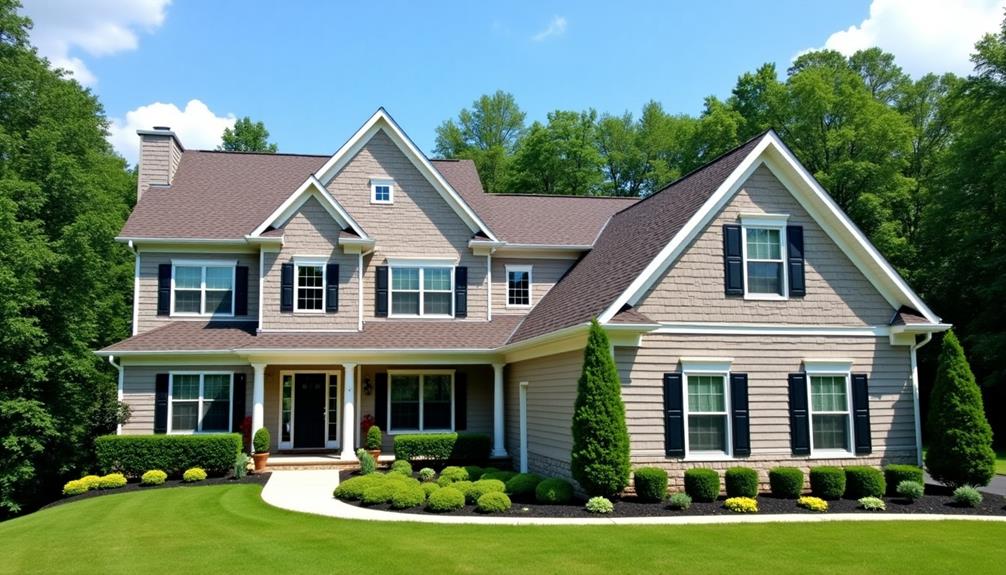If you're considering roof replacement in River Vale, NJ, you should be aware of key indicators signaling it's time for a new roof. Look for curling or missing shingles, water stains, and granule loss. Selecting the right materials, from cost-effective asphalt shingles to durable metal options, is crucial for longevity and aesthetics. The replacement process involves an initial inspection, skilled installation, and final walkthrough to ensure satisfaction. Timely replacement enhances energy efficiency and property value, making it a smart investment. Discovering expert tips on financing and finding reliable contractors can make your project even smoother.
Signs You Need Replacement
When you notice curling or missing shingles on your roof, it's a clear indicator that you may need a replacement. These signs often suggest that your roof's structural integrity is compromised, which can lead to more significant issues like leaks.
Regular leak detection is crucial; if you spot water stains on your ceilings or walls, it's a telltale sign that your roof may not be performing effectively.
Additionally, if your roof is approaching its expected lifespan—typically around 20 to 25 years for asphalt shingles—you should consider a replacement sooner rather than later. Delaying action can result in costly repairs down the line, as ongoing exposure to the elements can exacerbate existing issues.
Pay attention to granule loss in your gutters, as this can indicate deterioration. If you find multiple signs of wear, it's time to consult with a roofing professional.
They can provide a thorough inspection to assess your roof's condition and determine whether a complete replacement is necessary. Taking action promptly will help safeguard your home and extend the longevity of your investment.
Don't wait until minor problems escalate into major ones—address the issues head-on.
Choosing the Right Materials
Selecting the right materials for your roof replacement is crucial for ensuring durability and performance. You've got several options available, each with its own benefits and drawbacks.
Asphalt shingles are popular due to their cost-effectiveness and ease of installation, but if you're looking for longevity, consider metal roofing. It can withstand harsh weather and requires less maintenance over time.
If sustainability is important to you, explore eco-friendly options like recycled rubber shingles or solar tiles. These materials not only reduce your environmental footprint but can also lower energy costs in the long run. Additionally, some eco-friendly options may qualify for tax credits, making them financially attractive.
Don't forget to think about your local climate when choosing roofing materials. For instance, if you live in an area prone to heavy snowfall, opt for materials that can handle the load without compromising structural integrity.
Ultimately, the right materials will enhance your home's aesthetic appeal while providing the protection it needs. Take the time to research and consult with professionals to make an informed decision that aligns with your needs and values. Your roof is an investment, and choosing wisely pays off in the long run.
The Replacement Process
When you decide to replace your roof, the process begins with an initial inspection to assess your current situation.
You'll then explore various material selection options that best suit your needs and budget.
Initial Inspection Steps
Before diving into the roof replacement process, an initial inspection is crucial to assess the current condition of your roof.
You'll want to start by examining visible signs of damage, such as missing shingles, granule loss, or leaks. Using professional inspection tools like moisture meters and infrared cameras can help you uncover hidden issues that might affect your roof's lifespan.
Next, check the flashing around chimneys, vents, and valleys, as these areas are common failure points.
Pay attention to sagging sections of the roof, which can indicate structural problems. Don't forget to inspect the gutters and downspouts for debris, as clogged systems can lead to water pooling and further damage.
Document your findings and take photos for reference. This information will prove invaluable when discussing your options with contractors.
Material Selection Options
After completing the initial inspection and identifying any underlying issues, it's time to choose the right materials for your roof replacement. Your selection will significantly impact not just the aesthetics but also the longevity and energy efficiency of your home.
When it comes to shingle types, you have several options. Asphalt shingles are popular for their affordability and ease of installation. If you're looking for durability, consider metal roofing, which can last longer and withstand harsh weather conditions. For a more upscale look, slate or tile roofs provide excellent longevity and can enhance your home's value.
Don't overlook energy efficiency in your material choice. Certain shingles come with reflective coatings that can help reduce cooling costs during hot months. This can lead to substantial savings on your energy bills.
Additionally, consider insulation and ventilation systems that work harmoniously with your new roof to maximize energy efficiency.
Ultimately, the right material will protect your home while complementing its style. By weighing all these factors and consulting with a professional, you can make an informed decision that meets your needs and budget.
Installation and Cleanup
As the day of your roof replacement approaches, understanding the installation process is crucial for ensuring a smooth experience. Start with a thorough pre-installation checklist. This includes verifying the weather conditions, confirming the arrival of materials, and ensuring that your property is ready for the crew.
Clearing the area around your home not only provides easy access for the contractors but also protects your landscaping and personal belongings.
During the installation, the old roofing materials are stripped away, and the new ones are carefully laid down. Watch for proper ventilation and flashing; these are essential for longevity and preventing leaks.
It's a good idea to communicate with your contractor about what to expect throughout the day.
Once the installation is complete, the cleanup process begins. Your contractor should ensure that all debris is removed, and the area is left tidy.
You'll want to conduct a final walkthrough to confirm everything meets your expectations.
Don't forget about post-installation maintenance. Schedule regular inspections to extend the life of your new roof and address any potential issues early.
Benefits of Timely Replacement
Timely roof replacement offers significant advantages that can save you money and stress in the long run. By addressing roof issues promptly, you enhance your home's energy efficiency, reducing utility costs. Moreover, a new roof can dramatically increase your property's value, making it a smart investment.
Here's a quick overview of the benefits:
| Benefit | Description | Impact |
|---|---|---|
| Energy Efficiency | Modern materials provide better insulation. | Lowers energy bills. |
| Increased Value | A new roof attracts buyers and boosts resale price. | Enhances market appeal. |
| Preventative Measure | Early replacement avoids costly repairs from leaks. | Saves money on repairs. |
When you replace your roof on time, you're not just fixing a problem; you're investing in your home's future. The peace of mind that comes with knowing your roof is secure cannot be overstated. Don't wait for small issues to escalate into larger ones. By prioritizing a timely roof replacement, you ensure your home remains safe, efficient, and valuable for years to come.
Cost Considerations
When planning a roof replacement, understanding the costs involved is crucial to making an informed decision. The total expense can vary significantly based on materials, labor, and your roof's size and complexity.
Begin with budget planning; assess your financial situation and establish a clear budget that covers not only the replacement but also any additional repairs or unexpected costs that might arise.
Next, explore financing options that suit your needs. Many contractors offer flexible payment plans, allowing you to manage expenses over time. You might also consider home equity loans or personal loans that can provide the necessary funds without straining your immediate cash flow.
Don't forget to factor in potential energy savings from newer roofing materials, which could offset some costs in the long run.
Lastly, remember that investing in quality materials and workmanship now can save you from costly repairs or premature replacements later.
By prioritizing budget planning and evaluating financing options, you're setting yourself up for a successful roof replacement that meets both your financial and practical needs.
Be proactive, and ensure your investment pays off in durability and performance.
Finding a Qualified Contractor
When you're ready to replace your roof, finding a qualified contractor is crucial.
Start by checking their credentials and experience, as well as obtaining multiple estimates to ensure fair pricing.
Don't forget to ask about warranties, which can provide peace of mind and protect your investment.
Check Credentials and Experience
Choosing the right contractor for your roof replacement is crucial to ensuring a durable and reliable roofing system. To make an informed decision, you need to check the credentials and experience of potential contractors. Start by verifying their licensing requirements; a licensed contractor demonstrates compliance with local regulations and industry standards.
Next, look for industry certifications that indicate specialized training and expertise. These certifications not only highlight a contractor's skill level but also their commitment to quality workmanship.
Here's a quick comparison of what to look for:
| Criteria | Importance |
|---|---|
| Licensing Requirements | Ensures compliance with laws |
| Industry Certifications | Validates expertise and skills |
| Years of Experience | Indicates reliability and proficiency |
| Customer Reviews | Provides insights into past work |
Obtain Multiple Estimates
To ensure you select the best contractor for your roof replacement, obtaining multiple estimates is essential. This process not only helps you gauge the market rates but also empowers you in the estimate negotiation phase.
When you gather various quotes, you can compare pricing, materials, and labor costs, allowing you to make an informed decision that aligns with your budget planning.
Start by reaching out to at least three qualified contractors in River Vale, NJ. Request written estimates that detail the scope of work, materials used, and timelines.
This transparency will aid in identifying any discrepancies between offers and ensure you're not overpaying for services. During the estimate negotiation, don't hesitate to discuss the details with contractors.
They may offer insights or adjustments that can help you save money without compromising quality.
Ask About Warranties
Before committing to a roof replacement contractor, it's crucial to ask about warranties. Warranty types can significantly impact your investment, so understanding what's offered is essential. Typically, you'll encounter two main warranty categories: manufacturer warranties and workmanship warranties. Manufacturer warranties cover defects in the roofing materials, while workmanship warranties protect against installation errors.
When discussing warranty coverage, ensure you clarify the terms. Some warranties may only apply if specific installation guidelines are followed, and others might require regular maintenance to remain valid.
Don't hesitate to ask contractors about the duration of their warranties—longer coverage periods often indicate higher-quality work and materials.
It's also wise to inquire whether warranties are transferable. If you decide to sell your home, a transferable warranty can be a valuable selling point.
Make sure to get all warranty details in writing and review them carefully. This step will protect you from unexpected expenses down the line.


